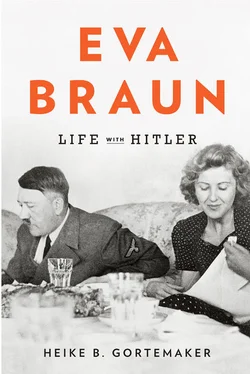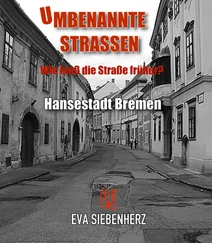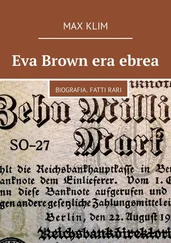Hitler, too, adored Richard Wagner and his music beyond all measure, and counted upper-class Wagnerians—such as the Munich publisher Hugo Bruckmann and his wife, Elsa, and the Berlin piano manufacturer Edwin Bechstein and his wife, Helene—among his early supporters. Ernst Hanfstaengl, the publisher’s son, moved in these circles as well, and it was in his apartment on Pienzenauer Strasse, by the Herzogpark, that Hitler and his companions concluded their Wagner evening on January 1. 54Eva Braun visited Hanfstaengl for the first time on that night, although he had, as he later reminisced, already noticed her a few months earlier in Hoffmann’s photography shop: “She was a pleasing-looking blonde… well built, with blue eyes and a modest, diffident manner.” On the evening of January 1, he wrote, Hitler was in a “relaxed mood” and “lively and in good spirits, the way he was in the early ’twenties.” According to Hanfstaengl, Hitler said: “This year belongs to us. I will guarantee you that in writing.” 55

Adolf Hitler and Eva Braun at the center of a group photo, 1932 (Illustration Credit 4.3)
This harmonious private occasion stood in stark contrast to the precarious political situation at the start of 1933, after the November election. The turnout was lower than in the summer elections and the NSDAP received two million fewer votes, losing 34 of their 230 Reichstag seats. Still, the National Socialists combined with the Communists, who gained votes, took a majority of the seats in the Reichstag, so that, as before, no governing majority in Parliament was possible without the participation of the radical parties. Chancellor Franz von Papen stepped down on November 17, after the failure of his plans to dissolve Parliament, and on December 3 Hindenburg named Kurt von Schleicher, Papen’s minister of defense, the new Chancellor. While Papen and Schleicher jockeyed for power, a leadership crisis broke out within the NSDAP. 56Gregor Strasser—Reich Organization Leader, head of the left wing of the Party, and for years Hitler’s only significant opponent within the Party itself—was willing to form a coalition, as opposed to the uncompromising head of the Party, who aimed solely at exclusive power, and he negotiated with Schleicher about forming a right-wing bloc and participating in the government. 57But he was unable to prevail over Hitler in the Party, and on December 8, Strasser stepped down from all his Party offices. Hitler, as Hinrich Lohse, the once-powerful Gauleiter of Schleswig-Holstein, recalled after the war, had shown himself “in this toughest test of the movement” to be “the master and Strasser the journeyman.” 58
In the following weeks, Hitler not only crushed Strasser’s central command structure within the NSDAP but also laid out again the organizational framework for his “personal” authority based on relationships of personal devotion. The document, from December 15, 1932, is called (in Hitler’s bureaucratic German) “Memorandum Concerning the Inner Reasons for the Instructions to Produce a Heightened Fighting Power of the Movement.” The document states:
The basis of the political organization is loyalty. In loyalty, the recognition of the necessity of obedience for the construction of every human community is revealed as the noblest expression of feeling…. Loyalty and devotion in obedience can never be replaced by formal, technical measures and institutions of any type. 59
Hitler was here demanding from the members of his party—especially the Gauleiters, or regional leaders, who formed its foundation—absolute loyalty. Any deviation from his dogma of devotion meant for him a delegitimizing of his claim to be the “Führer,” or “Leader,” and therefore could not be tolerated. In fact, Hitler was laying claim to what Max Weber once categorized as “charismatic authority.” In such a system of authority, according to Weber’s typology, there is only the leader and the disciples, and the leader is obeyed “purely personally… on the basis of the leader’s exceptional personal qualities,” so long as his “leadership quality,” his “charisma” and “heroism,” can constantly be established and reestablished. Competence, expertise, and privilege play no more of a role than does reliance on traditional bonds. 60Hitler himself spoke of the “fanatic apostles” who were necessary in order to spread the Nazi worldview. 61
Yet what effect did such leader-disciple bonds, which certainly existed between Hitler and close associates such as Hoffmann, Hess, and Goebbels, and later Speer and Bormann, have on Hitler’s relationship with Eva Braun? Was it acceptable, from the point of view of the “disciples,” that their idol, transfigured into someone or something larger than life by his own propaganda, showed himself to be as incomplete as any ordinary human being by having ordinary human needs? Did the same moral commandment of unswerving submission, which Hitler described as the foundation for every human community, apply to Eva Braun as well? According to Max Weber’s definition, the “charismatic leader” does not distinguish between private and public bonds, since his authority is based solely on “purely personal social relationships.” 62In this context, Eva Braun’s suicide attempt may well have demonstrated to Hitler her loyalty and adoration to the utmost possible degree, and the self-sacrifice that he demanded from all his followers. By January 1933, in any case, it was clear that, despite their unavoidable geographic separation, Eva Braun had become a lasting and crucial figure in Hitler’s life.
Meanwhile, in Cologne and Berlin, Hitler was in multiple negotiations about the formation of a new government with the scheming Franz von Papen, the opponent of the new Chancellor, Kurt von Schleicher. President Hindenburg was aware of these meetings and approved of them, and Schleicher suspected that the efforts to topple him were going on behind his back. 63The Nazi propaganda machine played up the significance of an NSDAP victory in the Landtag election in the principality of Lippe-Detmold on January 15, 1933, and this gave Hitler some tactical leverage. But a decisive turn in the question of who would be chancellor came about only due to the machinations of a businessman named Joachim von Ribbentrop, in whose villa in Dahlem outside Berlin Hitler had his meetings with Papen and then, on the evening of January 22, with Oskar von Hindenburg, the President’s adjutant and son. When Schleicher’s government stepped down on January 28, Papen gave his unqualified support to a Hitler cabinet. 64After conservatives such as Baron Konstantin von Neurath, the foreign minister; Count Lutz Schwerin von Krosigk, the finance minister; Baron Paul von Eltz-Rübenach, the postal and traffic minister; and Alfred Hugenberg, the head of the German National People’s Party (DNVP), declared themselves willing to work in a government led by Hitler, Hindenburg named the NSDAP leader Chancellor, on January 30, 1933. 65
Hitler had reached his goal. Immediately after his swearing in, he had himself driven the few steps from the Reich Chancellery to the Hotel Kaiserhof, flanked by cheering crowds. 66Numerous faithful followers were already waiting there, including Göring, Goebbels, Hess, Hanfstaengl, and Hoffmann. Together they celebrated attaining the center of power in the German Reich. “Wilhelmstrasse is ours,” Goebbels remarked, full of satisfaction, in his diary that would be published a year later as Vom Kaiserhof zur Reichskanzlei (From Kaiserhof to the Reich Chancellery). 67Hess wrote to his wife, Ilse, that he had “not thought possible until the last moment” what had now become “reality.” 68
Читать дальше













